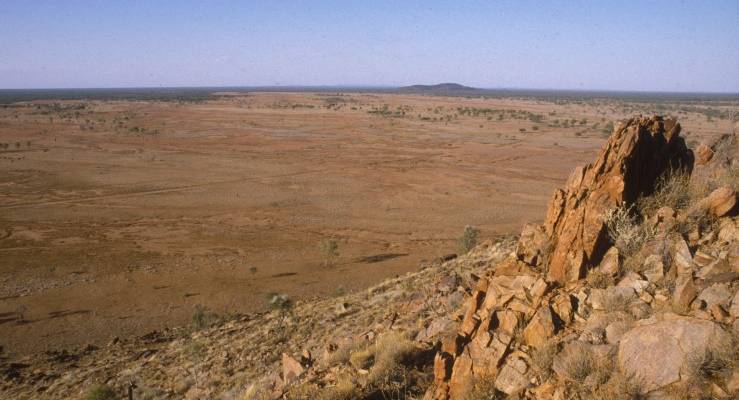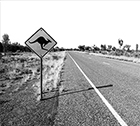
A few weeks ago I went to Adelaide for work. As is my wont when in Adelaide, I headed for the Central Markets just off Victoria Square — always my first stop for good food I can’t get in Darwin. I was also looking for bookshops, and eventually spotted a copy of C.P. Mountford’s Nomads of the Australian Desert with a $500 price tag.
I pointed out to staff in the shop that Nomads is a very dangerous book to have on display and for sale, particularly in Adelaide and because its subject matter — the secret and sacred knowledge of the Pitjantjara people, given to Mountford in confidence during fieldwork in the 1940s — was the subject not only of a strongly worded caveat by the author, but also a 1976 judgement by Justice James Muirhead of the Supreme Court of the Northern Territory. This judgement restrained the book’s sale, display or distribution in the Northern Territory.
I’ll return to the bookshop and Muirhead’s judgement shortly, but note that his judgement was and remains effective only within the Northern Territory, having no effect (other than persuasive) outside of that jurisdiction, including the expansive traditional lands of the Pitjantjara and their affiliates — with whom they share much secret and sacred knowledge — in the states of South and Western Australia.
Mountford — who didn’t take any formal anthropological training until after his retirement from a long career as a public servant — was, for some, a giant of Australian ethnology. But by others he was damned with the faintest of praise.
Professor A.P. Elkin, who held the first Australian chair of anthropology at Sydney University, described Mountford as an “amateur ethnographer” and a “good photographer, particularly of still subjects”. Elkin’s student Catherine Berndt, wrote to Elkin saying that Mountford knew “just enough to prevent him from realising his ignorance”.
The Adelaide establishment — then and later — held Mountford in higher esteem, crediting him with bringing Aboriginal art and culture to the attention of a wide national and international audience.
Mountford was undoubtedly a gifted ethnographer, and he travelled widely across Australia and produced a number of books and films of varying degrees of scientific accuracy and utility. He died the same year that his magnum opus, Nomads, was published and subsequently withdrawn.
Mountford included the following caveat in Nomads of the Australian Desert:
Where Australian Aborigines are concerned, and in areas where traditional Aboriginal religion is still significant, this book should be used only after consultation with local male religious leaders.
The restriction is important, it is imposed because of the concept of what is secret or may not be revealed to the uninitiated in Aboriginal religious belief and action, varies considerably throughout the Australian continent and because the varying views of Aborigines in this respect must on all occasions be observed.
Shortly after Nomads was published, and notwithstanding Mountford’s caveat, Justice Muirhead saw fit to impose an injunction on the sale and distribution of the book in the Northern Territory.
Foster and Others v Mountford and Rigby Ltd (1976) was an unusual case in a number of respects. Firstly, the plaintiffs were members of an unincorporated association (the Pitjantjara Council) that represented the Pitjantjara people, who live on large tracts of land that spans the south-western corner of the Northern Territory, the north-west of South Australia and the far central east of Western Australia.
The respondents were Mountford as author and his publishers, Rigby Ltd, and neither were represented before Justice Muirhead, as the application for an injunction was bought ex parte and was heard in chambers — i.e. with only one side, the Pitjantjara people, appearing before and providing evidence to the court and not heard in open court.
The application was also unusual in that it sought to protect gender-specific confidential information of the Pitjantjara people published in Nomads that they claimed was provided to Mountford in confidence more than 35 years earlier.
The Pitjantjara also claimed that Mountford was obliged to protect their confidences and had breached that duty by publishing Nomads. Few, if any, of those who provided the information to Mountford were alive at the time the application to the court was made.
It is understood that Rigby Ltd withdrew Nomads from sale following Justice Muirhead’s decision and that around 2000 copies were sold before the withdrawal and that several hundred more were destroyed in a warehouse fire, with the remaining copies purchased by the Aboriginal Arts Board.
A search of the National Library of Australia’s Trove catalogue indicates that Nomads is available in at least 70 Australian libraries, including the Alice Springs Public Library, where I last saw it in a locked case 10 years ago.
A simple Google search of Nomads produces links to a number of Australian and international booksellers with the book for sale. Prices range from a low of US$388 (A$552) to US$1,027 (A$1,462).
Those numbers make the copy of Nomads for sale in Adelaide a bargain. When last I checked it was still for sale for $500, plus $20 postage.
This is an edited excerpt from Bob Gosford’s Northern Myth blog. Read the full article here.








So it shouldn’t be displayed in shops, but it’s ok to write about it on a national news site? Oh the hypocracy. Almost every single person reading this article wouldn’t know of this book, but now they do. Well done.
How does this differ, in essence, from the sacrednicityness of Uluru or that wankers boondoggle Hindmarsh, so well explored by Margaret Simons, once of this parish?
Oestrogen or testosterone, neither are good ink admixtures.
If ‘sacred’ is a legal term then why not blasphemy?
Secret and sacred eh!
The world has enough mystical bollocks on open display. Whatever kooky shit this refers to ought to remain private. We’ve no need for it.
I wonder if a book of ‘secret sacred’ rites of the Roman Catholic Church exclusive to consecrated males (if they existed) would attract such legal protection if given in confidence to a public servant?
Would we not hear claims about ‘the public interest’ and ‘newsworthy’ and ‘whistleblowers’ et al??